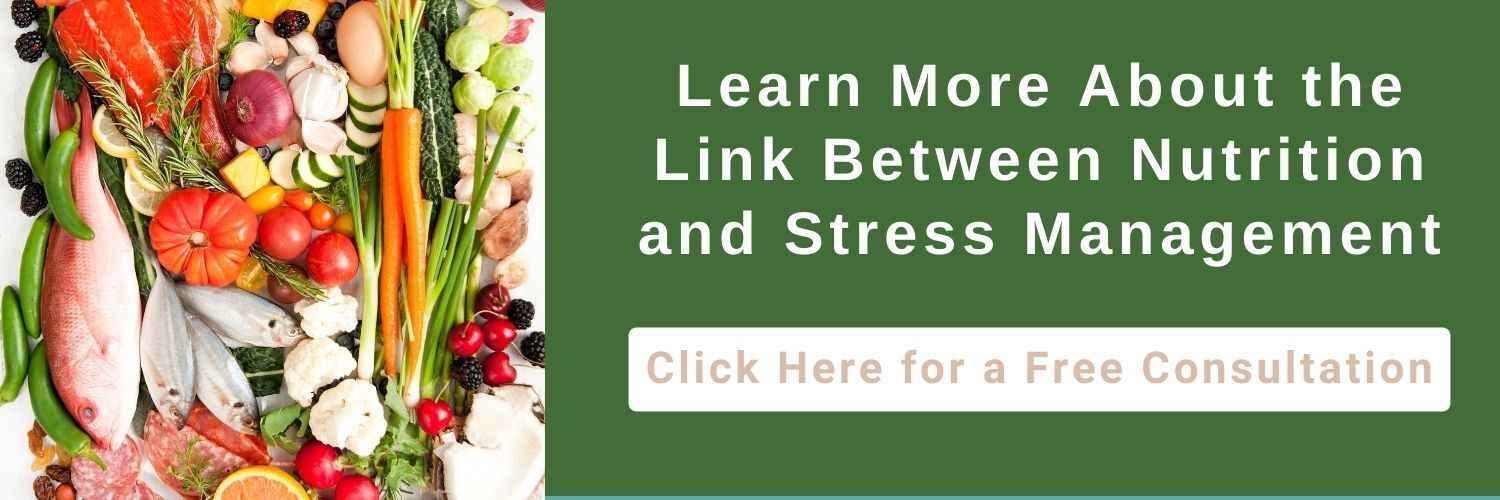Is There a Link Between Nutrition and Stress? How Your Diet Has the Potential to Be the Ultimate Stress-Buster
"The content below is not intended to be a substitute for professional medical advice, diagnosis, or treatment. Always seek the advice of your physician or other qualified health provider with any questions you may have regarding a medical condition."
It’s the middle of the night and BAM, you shoot up in bed and realize you missed an important client deadline.
It’s Thursday at 6:30 am and you remember that your daughter’s cheerleading bake sale is today and you have nothing.
You’re halfway to the airport when you realize your passport is still sitting on the kitchen counter.
Stress. We’ve all been there.
While it’s inescapable, it doesn’t have to be debilitating.
Through nutrition, you can help manage the effects of daily stress before it starts getting the better of your health. This guide shows you how.
Table of Contents
Nutrition and Stress Management — Does What You Eat Matter?
Diet has always played an essential role in our overall health, and stress is part of that.
If you’re already feeling stressed and anxious, certain foods may exacerbate those feelings by causing increased blood pressure or heart rate, while other foods may help to counteract the effects of that stress.
Eating a healthy, balanced diet can also help to keep your stress at manageable levels.
Proper nutrition and eating regularly play an important role in managing cortisol production, the hormone directly linked to stress.
How Does Diet Affect Stress?
Eating a healthy, balanced diet can support the immune system function, provide the extra energy required to cope with stress, and regulate cortisol levels.
Conversely, eating an unhealthy, irregular, or unbalanced diet — such as eating fast food or not eating regularly — has been associated with increased cortisol levels and psychiatric symptoms, such as stress.
Increases in stress may cause additional issues, such as:
- Increased blood sugar levels
- Weight gain or obesity
- Suppressed immune system
- Digestive problems
- Heart disease
- Metabolic syndromes
- Type 2 diabetes; and
- Depression and other disorders of the brain
This is why it’s crucial to include foods such as fruits, vegetables, lean proteins, whole grains, and healthy fats into your diet. These foods give your body the nutrients it needs for cortisol management and proper brain function.
Through Nutrition Response Testing, Dr. Donna Sergi at HealthierU in Brooklyn, NY, is committed to getting to the root cause of your stress. We believe in a holistic approach to healing.
If you’re ready to ditch the prescriptions and over-the-counter anxiety and stress meds and get back to a healthier you, contact us today.
Which Foods Negatively Affect the Body When You’re Stressed? 4 Things to Avoid
#1: Caffeine
Caffeine makes us feel as though we have more energy, motivation, and even a better mood, but it soon plummets, making us crave more caffeine to get that feeling again. As a result, you may lose sleep, feel more stress, and suffer health consequences, such as hypertension.
Caffeine can cause an increase in the production of cortisol and excessive caffeine may lead to negative health effects and prolonged elevated levels of cortisol, known as chronic stress.
Healthy adults should limit their caffeine intake to less than 400mg a day, however, the ideal amount is between 150 to 200mg.
#2: Foods With High Sugar Content
Some people may cope with stress by reaching for their favorite chocolate bar or pint of ice cream. If this is you, you’re certainly not alone.
Sugary foods can help you feel less anxious by suppressing the hypothalamic-pituitary adrenal (HPA) axis in your brain. But, this temporary sweet fix does more damage than good.
The more sugar you eat, the more reliant you become, which ultimately raises the risk of health problems such as obesity.
Next time you find yourself reaching for that tub of Chunky Monkey, grab a piece of fruit instead. You’ll satisfy your craving while giving your body the nutrition it actually needs to help cope with stress.
#3: Fatty Foods
Stress causes that flight-or-fight response that helps us cope with potential threats, but with this response comes a whole lot of cortisol.
Cortisol causes us to crave fatty foods because your brain is telling you that you’ll need fuel to be able to deal with the perceived threat.
However, foods loaded with trans fats, such as fast food, cause inflammation and are harder to digest, putting even more stress on your body.
#4: Alcohol
If you’re among the millions of Americans who get home from a day of work and immediately feel the need to crack open a beer or pour a glass of wine, you may want to rethink this strategy.
While one glass of wine may help you feel more relaxed after a stressful day, any more than that and you’re adding fuel to the fire.
Alcohol increases hormone production and can cause even more stress than you had before you opened the bottle of wine.
It may also increase blood pressure and heart rate, which triggers stress-like symptoms within your body.
What Nutrients Help With Stress?
A diet rich in
vitamins C, D & B1, omega-3, and fiber will help
reduce stress levels and
improve mood. Consuming foods rich in these nutrients is essential to physical and mental wellbeing, but it may be difficult to get everything you need through diet alone. All of these nutrients can be taken through
supplements to achieve your recommended daily intake.
Vitamin C
Most people think of vitamin C for fighting colds, but studies show that people with anxiety who take vitamin C show decreased levels of stress. Vitamin C is an antioxidant that can help control cortisol levels in the body, keeping stress at bay.
Daily vitamin C is essential to promoting a stress-free daily life. You can get a dose of vitamin C in the following foods:
- Citrus (kiwi, oranges, grapefruit, lemon)
- Bell peppers
- Tomatoes
- Cruciferous vegetables (broccoli, cabbage, cauliflower)
- Strawberries
- White potatoes
Vitamin B1
B vitamins are well-known for providing energy, but they’re also crucial for emotional health. Vitamin B1, or thiamine, is often called the anti-stress vitamin. Not only can it help improve your mood, but it’s been used to treat depression as well.
Vitamins B3, B9, and B12 also help promote healthy brain function and improve mood. You can get your daily dose of B vitamins by eating the following foods:
- Meat
- Poultry
- Seafood
- Eggs
- Dairy Products
- Leafy greens
- Seeds
- Legumes
- Nutritional yeast
Vitamin D
The sunshine vitamin is often used to promote healthy bone, teeth, and brain development, but sadly, an estimated 1 billion people suffer from vitamin D deficiencies worldwide. This deficiency is directly linked to acute stress.
Getting your daily dose of vitamin D may significantly improve your mental health by reducing feelings of stress and depression.
In addition to taking a 30-minute walk outside each day, you can get vitamin D by eating the following foods:
- Milk
- Fatty fish (salmon, tuna, mackerel)
- Beef liver
- Egg yolks
- Cheese
Getting the recommended amount of vitamin D from food alone can be difficult, which is why you may want to consider supplementing. People under the age of 70 should aim for 600 IU and those over 70 should take 800 IU.
Omega-3s
Low omega-3 intake has been linked to depression in Western societies. Not only are omega-3s essential for brain health, but they improve mood and help reduce stress levels as well.
Foods that are rich in omega-3s include:
- Mackerel
- Salmon
- Cod liver oil
- Herring
- Oysters
- Sardines
- Anchovies
- Caviar
- Flaxseed
- Chia seed
- Walnuts
- Soybeans
Because omega-3 can be difficult to get through diet alone, many people choose to supplement with fish oils or vegetarian capsules.
Fiber
In recent years, more research has been conducted that examines the relationship between gut health and stress-related disorders such as depression, anxiety, and irritable bowel syndrome.
Bacteria that live in the gut produce short-chain fatty acids (SCFAs), the main source of nutrition for cells in this part of the body. Eating foods high in fiber stimulates the production of SCFAs, helping to keep the gut healthy.
When your gut is healthy, you’re less likely to experience a “leaky gut” which may result in inflammation, stress, and depression.
Try adding these high-fiber foods to your diet:
- Beans and lentils
- Broccoli
- Avocados
- Berries
- Apples
- Whole grains
- Natural popcorn (no butter)
- Nuts
- Potatoes
- Dried fruits
Diet for Stress Management: What Can You Do to Lower Stress Levels Naturally?
Eat Regularly
Have you ever heard someone say that they’re “hangry?” We call that a combination of hunger and stress, which is what happens when you skip meals.
Skipping meals causes your blood sugar to decrease, your cortisol production to increase, and your metabolism to slow down.
This is all kinds of stress on your body, and usually causes people to feel irritable, confused, and downright exhausted.
So, whether you prefer eating three square meals a day or five smaller meals, stay consistent and don’t skip out.
Practice Mindful Eating
Unfortunately, stress eating is all too common. We live in a fast-paced world where people sometimes get by wolfing down a few Girl Scout cookies to work through lunch or grab a donut and a coffee for breakfast in the drive-thru.
Eating quickly, or without noticing what and how much we are eating is a dangerous habit that can quickly lead to problems.
Mindful eating practices can counteract stress by:
- Encouraging thoughtful food choices
- Focusing attention on the meal
- Encouraging deep breaths; and
- Chewing slowly and deliberately
This practice not only aids in the proper digestion of food, but it increases the enjoyment of the meal.
Mindful eating also teaches us to recognize when we are eating because of psychological unrest —
not physiological hunger.
Learn Your “Trigger” Foods
If you’re experiencing chronic stress, keeping a food journal may help identify foods that you eat when stressed or foods that may have contributed to stress.
Identifying these “trigger” foods and removing them from your diet may prove beneficial in the reduction of stress and stress-related disorders
Trade Your Caffeinated Drinks for More Sleep
Sleep is a powerful stress reducer.
Sticking to a regular sleep routine will help keep your body feeling restored and it also aids in:
- Improved concentration
- Mood regulation
- Sharper judgment; and
- Decision making
When you’re well-rested, you’re able to solve problems with more ease than if you were tired or hopped up on caffeine, making it less likely that you’ll get stressed over the little things.
If you have a hard time getting the sleep you need at night, consider a 20-minute power nap throughout the day instead of that extra cup of coffee.
A
20-minute nap in the afternoon can be more effective in providing the rest we need than 20 extra minutes in the morning.
Keep Healthy Snacks Readily Available
When we get tired or stressed, we find ourselves rummaging through the pantry for a salty snack or a sweet treat. But, as you now know, these types of snacks do more harm than good and can easily exacerbate your stress.
Keep a stash of healthy snacks in your car, at work, and home for those times when food feels like the answer to your problem.
A handful of trail mix or a banana can help satisfy those salty or sweet cravings while keeping your body properly fueled.
Learn How to Improve Your Nutrition to Reduce Stress Levels With HealthierU
Eat HealthierU in Brooklyn, NY, Dr. Donna Sergi continually works with patients to find the correlation between nutrition and stress. Using a unique system, called Nutritional Response Testing, Dr. Sergi can help identify foods that may be aggravating your stress response.
Nutrition Response Testing is a holistic approach to healing that emphasizes mind-body balance.
We don’t believe in band-aid solutions. Instead, we’ll focus on getting to the root cause of your stress and formulate a plan that will eliminate the problem.
For more information, or to schedule a consultation, contact HealthierU today.






